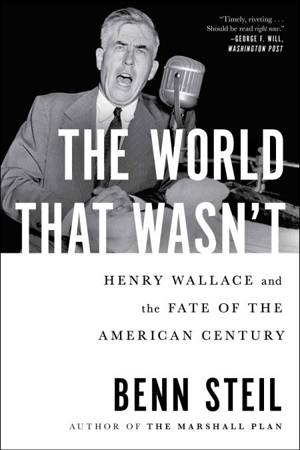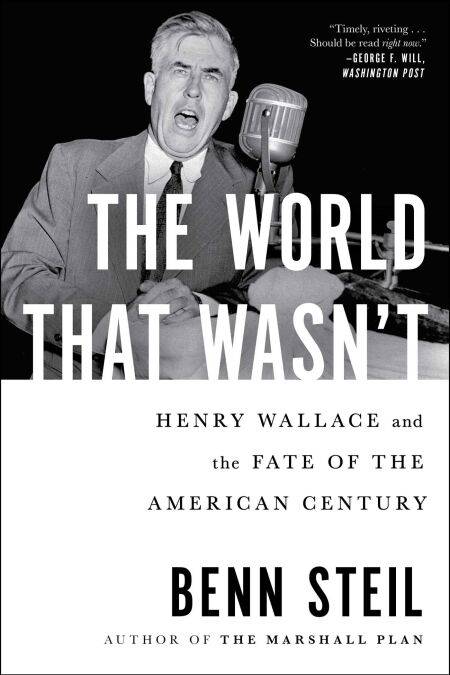
- Afhalen na 1 uur in een winkel met voorraad
- Gratis thuislevering in België vanaf € 30
- Ruim aanbod met 7 miljoen producten
- Afhalen na 1 uur in een winkel met voorraad
- Gratis thuislevering in België vanaf € 30
- Ruim aanbod met 7 miljoen producten
Zoeken
The World That Wasn't E-BOOK
Henry Wallace and the Fate of the American Century
Benn Steil
E-book | Engels
€ 21,24
+ 21 punten
Omschrijving
From the acclaimed economist-historian and author of The Marshall Plan, a “timely, riveting” (The Washington Post) new perspective on the political career of Henry Wallace—one that will forever change how we view the making of US and Soviet foreign policy at the dawn of the Cold War.
Henry Wallace is the most important, and certainly the most fascinating, almost-president in American history. As FDR’s third-term vice president, and a hero to many progressives, he lost his place on the 1944 Democratic ticket in a wild open convention, resulting in Harry Truman becoming president upon FDR’s death. Books, films, and even plays have since portrayed the circumstances surrounding Wallace’s defeat as corrupt, and the results catastrophic. Filmmaker Oliver Stone, among others, has claimed that Wallace’s loss ushered in four decades of devastating and unnecessary Cold War.
Now, based on striking new finds from Russian, FBI, and other archives, Benn Steil’s The World That Wasn’t paints a decidedly less heroic portrait of the man, of the events surrounding his fall, and of the world that might have been under his presidency. Though a brilliant geneticist, Henry Wallace was a self-obsessed political figure, blind to the manipulations of aides—many of whom were Soviet agents and assets.
From 1933 to 1949, Wallace undertook a series of remarkable interventions abroad, each aimed at remaking the world order according to his evolving spiritual blueprint. As agriculture secretary, he fell under the spell of Russian mystics, and used the cover of a plant-gathering mission to aid their doomed effort to forge a new theocratic state in Central Asia. As vice president, he toured a Potemkin Siberian continent, guided by undercover Soviet security and intelligence officials who hid labor camps and concealed prisoners. He then wrote a book, together with an American NKGB journalist source, hailing the region’s renaissance under Bolshevik leadership. In China, the Soviets uncovered his private efforts to coax concessions to Moscow from Chiang Kai-shek, fueling their ambitions to dominate Manchuria. Running for president in 1948, he colluded with Stalin to undermine his government’s foreign policy, allowing the dictator to edit his most important election speech. It was not until 1950 that he began to acknowledge his misapprehensions regarding the Kremlin’s aims and conduct.
Meticulously researched and deftly written, The World That Wasn’t is a spellbinding work that shows how “American history—and world history—could have turned out very differently if just a few things had gone the other way” (The Wall Street Journal).
Henry Wallace is the most important, and certainly the most fascinating, almost-president in American history. As FDR’s third-term vice president, and a hero to many progressives, he lost his place on the 1944 Democratic ticket in a wild open convention, resulting in Harry Truman becoming president upon FDR’s death. Books, films, and even plays have since portrayed the circumstances surrounding Wallace’s defeat as corrupt, and the results catastrophic. Filmmaker Oliver Stone, among others, has claimed that Wallace’s loss ushered in four decades of devastating and unnecessary Cold War.
Now, based on striking new finds from Russian, FBI, and other archives, Benn Steil’s The World That Wasn’t paints a decidedly less heroic portrait of the man, of the events surrounding his fall, and of the world that might have been under his presidency. Though a brilliant geneticist, Henry Wallace was a self-obsessed political figure, blind to the manipulations of aides—many of whom were Soviet agents and assets.
From 1933 to 1949, Wallace undertook a series of remarkable interventions abroad, each aimed at remaking the world order according to his evolving spiritual blueprint. As agriculture secretary, he fell under the spell of Russian mystics, and used the cover of a plant-gathering mission to aid their doomed effort to forge a new theocratic state in Central Asia. As vice president, he toured a Potemkin Siberian continent, guided by undercover Soviet security and intelligence officials who hid labor camps and concealed prisoners. He then wrote a book, together with an American NKGB journalist source, hailing the region’s renaissance under Bolshevik leadership. In China, the Soviets uncovered his private efforts to coax concessions to Moscow from Chiang Kai-shek, fueling their ambitions to dominate Manchuria. Running for president in 1948, he colluded with Stalin to undermine his government’s foreign policy, allowing the dictator to edit his most important election speech. It was not until 1950 that he began to acknowledge his misapprehensions regarding the Kremlin’s aims and conduct.
Meticulously researched and deftly written, The World That Wasn’t is a spellbinding work that shows how “American history—and world history—could have turned out very differently if just a few things had gone the other way” (The Wall Street Journal).
Specificaties
Betrokkenen
- Auteur(s):
- Uitgeverij:
Inhoud
- Aantal bladzijden:
- 704
- Taal:
- Engels
Eigenschappen
- Productcode (EAN):
- 9781982127848
- Verschijningsdatum:
- 8/01/2024
- Uitvoering:
- E-book
- Beveiligd met:
- Adobe DRM
- Formaat:
- ePub

Alleen bij Standaard Boekhandel
+ 21 punten op je klantenkaart van Standaard Boekhandel
Beoordelingen
We publiceren alleen reviews die voldoen aan de voorwaarden voor reviews. Bekijk onze voorwaarden voor reviews.











